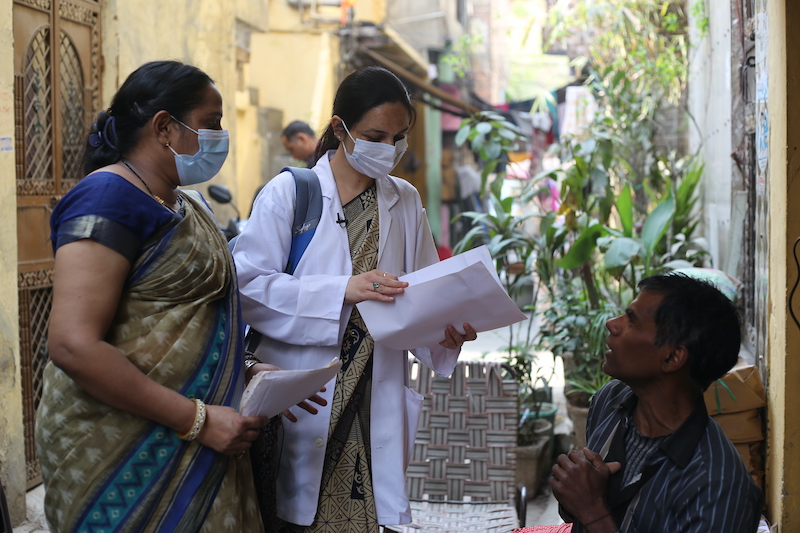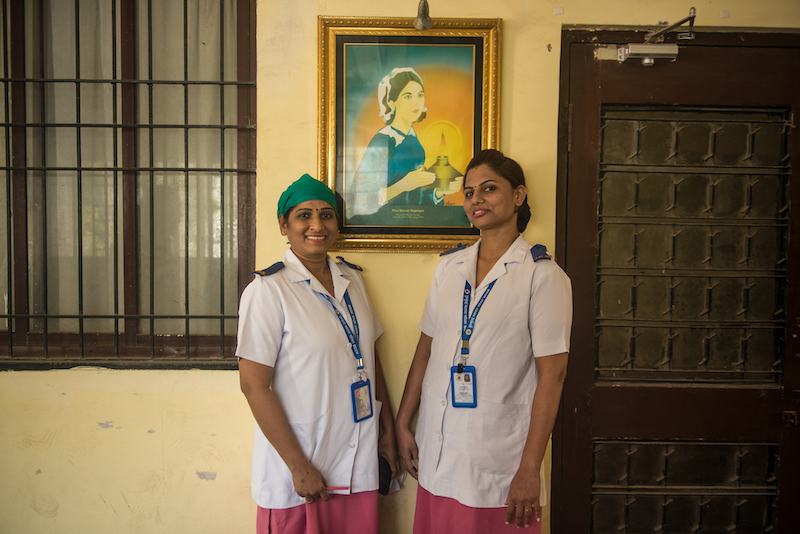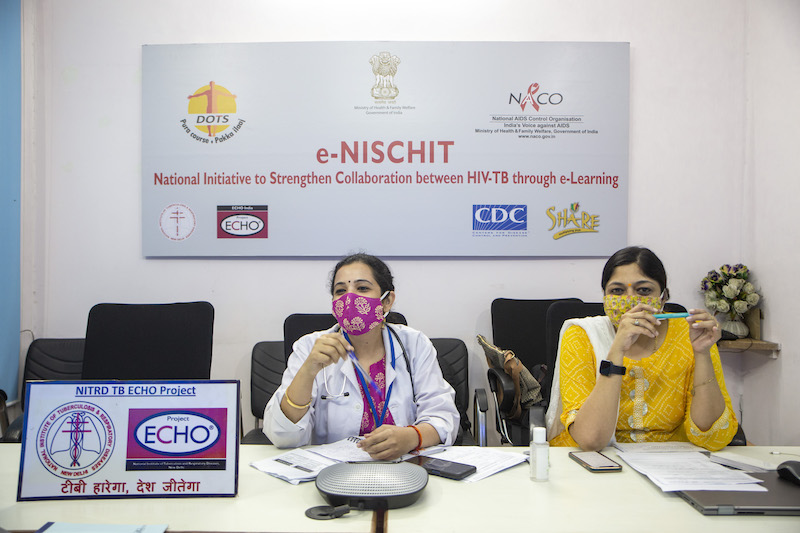In the bustling corridors of a district hospital in rural Uttar Pradesh, a doctor learns through her smartphone how to treat complex tuberculosis cases.
Thousands of miles away in Mumbai, a municipal nurse applies the new protocols for infection control she learned just days earlier.
In a remote village in Assam, a primary care physician confidently manages a patient with mental health issues, benefitting from best-practice knowledge and mentorship he once thought was out of reach.
These situations are now commonplace across India, thanks to 483 partners who are implementing Project ECHO’s telementoring model.

ECHO participants speak with community members in the remote village, Assam, in northeastern India. Photo Credit: ECHO India, provided August 2024.
The Growth of a Movement
Created in 2003 to alleviate the systemic need for better, and timely, hepatitis C treatment in New Mexico, the ECHO Model proved adaptable to different health care needs and geographic settings — an attractive solution to India’s unique challenges.
“We faced a dire need to reach the last mile in India. Our geographical expanse, topographical challenges, language barriers and cultural diversity limited scope for traditional models,” says Dr. Col. Kumud Rai, chairperson and managing trustee of the ECHO India Trust.
Established in 2008, ECHO India tackled its first big obstacle in implementing the ECHO Model at scale, locally: India’s technological limitations. Without widespread 2G and 3G connectivity, the team explored alternative knowledge-sharing methods, such as Polycom and videoconferencing, paving the way for future success.
2015 was a turning point for ECHO India. As the country’s telecom infrastructure improved, the organization found its first significant champions: the National Institute of Mental Health and Neurosciences, and the National Institute of Tuberculosis and Respiratory Diseases.
“We knew we were onto something big. These partnerships showed us the true potential of the ECHO Model in India. Our partnership with NIMHANS in Chhattisgarh has transformed mental health care,” says Dr. Rai, noting that district hospital doctors have treated more than 150,000 patients. And, community health workers, called “ASHAs,” now provide a crucial intervention in public health by identifying and referring patients to appropriate mental health services. “The ASHAs have led to significant improvements in lives of many, especially women,” adds Dr. Rai.

Nurses, community health workers, and other health care providers—who are primarily women—benefit from access to more continuing education with ECHO programs. Photo Credit: ECHO India, provided August 2024.
Thanks to the successful expansion of its partnerships, ECHO India is able to provide timely, best-practice health care to even the most remote areas.
“We’re creating a culture of continuous learning in Indian health care system,” says Dr. Sandeep Bhalla, vice president of projects at ECHO India. Now, with more than 450 ECHO Hubs, each Hub presents a community of learning, where health care providers at all levels can access expertise, share experiences, and improve patient outcomes.
And, “it’s not just about quantity,” says Dr. Bhalla, emphasizing that ECHO India strengthens health systems by integrating with national programs, state-level National Health Missions, academic centers of excellence, nursing councils, and municipal corporations to bridge knowledge gaps through trusted human networks.
Today, ECHO India collaborates with all state governments, 15 nursing councils, 19 India Institutes of Medical Sciences, 6 municipal corporations, and several other institutions.
Notably, during the COVID-19 pandemic, ECHO India’s established partnerships and the trusted human networks were a lifeline for dissemination and implementation of best practices throughout the country and beyond, supporting the World Health Organization’s global response efforts.
Addressing Social Determinants of Health
As ECHO India evolved, its leadership recognized that strengthening health systems also requires addressing other underlying issues, including education, food systems, livelihoods, and sanitation. This insight prompted ECHO India to broaden its focus beyond health care.
“I realized children were not reading, which impacted their overall learning,” says Anuradha Rai, a professional educator; in 2015, she was the first to use ECHO Model for education in India.
Recognizing the urgent need for structural support for teachers, Rai launched ECHO programs focused on reading and comprehension, and math competency at the Ambience School in New Delhi, where she served as principal.

ECHO programs in India expanded to include education. Photo Credit: ECHO India, provided August 2024.
ECHO’s mission is to empower educators to foster students’ curiosity and critical thinking skills. “It has made me a life-long learner, which brings immense joy in this profession,” says Meeta Manchanda, academic coordinator, Ambience Public School, New Delhi. In addition to teachers, ECHO supports counselors, principals and other school leaders who can support systemic change.
Building on this momentum, ECHO India turned to agriculture and livelihoods, recognizing the vital links between food systems, nutrition and overall well-being.
“We’re now working to bring evidence-based practices directly to farmers,” says Sanjay Joshi, head of climate change, agriculture, and livelihoods at ECHO India. “Through collaborations with the Ministry of Agriculture and the M.S. Swaminathan Research Foundation, we aim to empower farmers with the knowledge they need to improve both yields and health.”
These strategic expansions are reshaping ECHO India’s impact, addressing the foundational elements that support healthier communities.
In recognition of its groundbreaking work, ECHO India has received:
- The prestigious Mahatma Gandhi Award
- The QCI-DL Shah Quality Award
- Financial Express award for the Best Public Health Initiative
- Associated Chambers of Commerce and Industry of India for Corporate Social Responsibility Implementation and IT Innovation award
Hope on the Horizon
ECHO India’s partners are consistently broadening their efforts by leveraging the ECHO Model. The organization is setting its sights on emerging health challenges, particularly those affecting India’s youth. Plans are underway to address addiction, cardiometabolic issues, cervical cancer and noncommunicable diseases.
There’s a renewed focus on inclusivity. ECHO India is developing programs specifically tailored for transgender health, recognizing the unique challenges faced by this community. And, in support of the crucial role of gender equity in health outcomes, ECHO India is working on women’s empowerment in the agricultural sector.

The ECHO Model, in providing more equitable access to professional development, supports women’s access to leadership roles. Photo Credit: ECHO India, provided August 2024.
Dr. Col. Kumud Rai reflects on the organization’s journey over the past 15 years, observing progress and potential. “We’ve come a long way, but our work is far from over. Every life improved, every provider empowered, drives us forward. In ECHO, we see the future of health care, and it’s a future where quality care is within everyone’s reach.”
The ECHO movement is clear and growing: in the race to improve wellbeing of communities, knowledge truly is power. In India, that power is now reaching further than ever before, transforming communities one connection at a time.
For more information about Project ECHO in India, visit ECHO India’s website or email the partner team.
Featured Image: Caption information not available. Photo Credit: ECHO India, provided August 2024.

